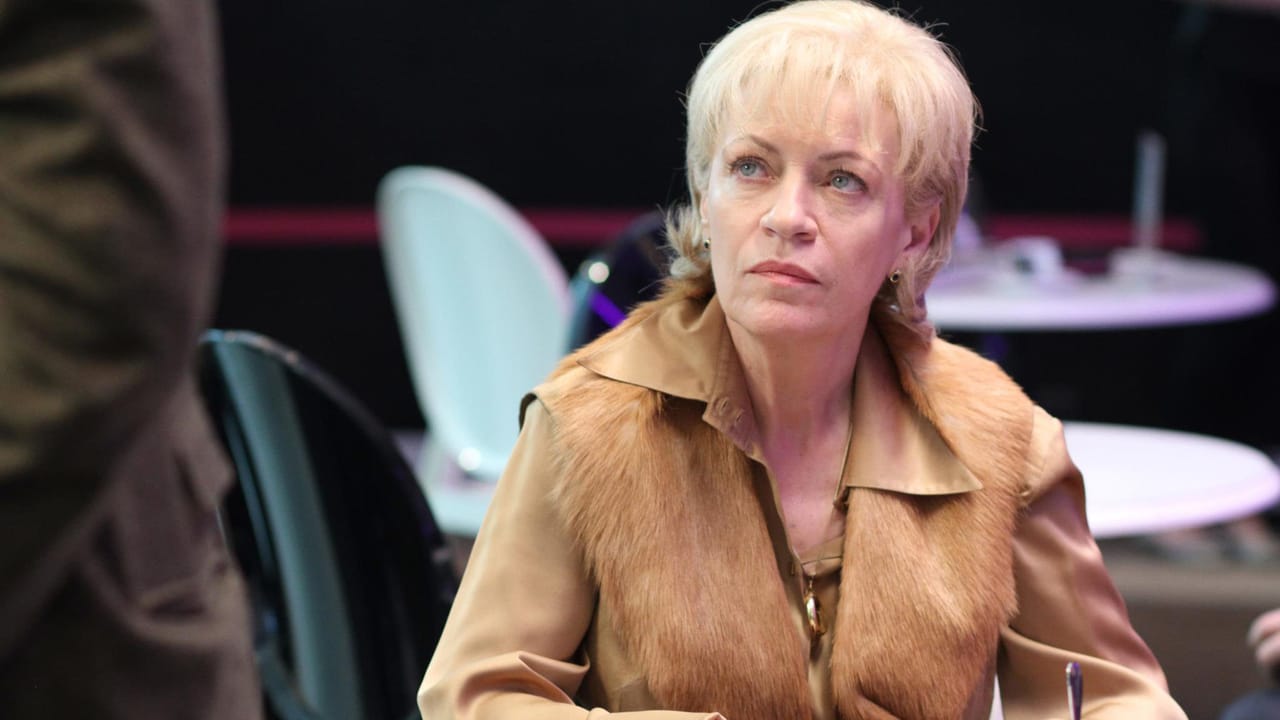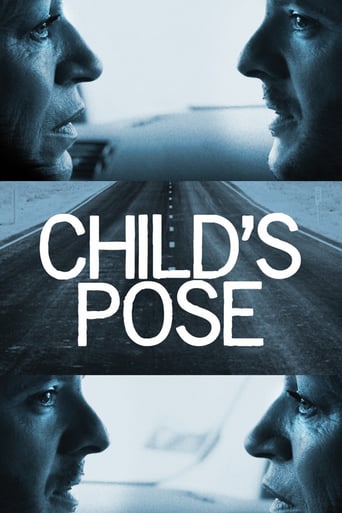Linbeymusol
Wonderful character development!
PlatinumRead
Just so...so bad
Tobias Burrows
It's easily one of the freshest, sharpest and most enjoyable films of this year.
Roland E. Zwick
A haunting slide-of-life drama from Romania, "Child's Pose" explores the strained relationship between a middle-aged mother and her adult son, set within the context of an unspeakable human tragedy. Cornelia Keneres, portrayed with masterful understatement and restraint by Luminita Gheorghiu, is a haughty, emotionally aloof woman who, nevertheless, just can't seem to cut the cords that bind her to her only child, Barbu (Bogdan Dumitrache). Barbu, of course, resents his mother's endless interference in his life, an interference that is only intensified when he tragically runs over and kills a 14-year-old boy who's crossing a freeway on which Barbu is driving recklessly. Because Barbu seems devoid of initiative in trying to make things right with both the legal system and the family of the victim, Cornelia launches into full Mama Bear mode, lavishing large sums of money in her wake as she attempts to clean up the life-shattering mess her son has made for himself and others. Is Cornelia now paying the consequences for treating her son as a child for so long? Is that why he now finds himself unable to step up to the plate and accept responsibility for his actions as a mature adult should?Filmed in a wholly realistic and naturalistic style, "Child's Pose" is about as far from melodrama as a movie about life-and-death issues could possibly be. There are no grand speeches, no emotional outbursts springing from the tragic events of the story. The movie makes us feel as if we are eavesdropping on these people as they go about the business of trying to make sense of an entirely senseless situation. As such, we get to witness first-hand the agony and grief, the bitterness and guilt, and the thirst for redemption that the various characters are going through. As embodied by the extraordinary Gheorghiu, Cornelia becomes a fascinatingly complex character made up of any number of inconsistencies and contradictions. For instance, she's constantly deriding Barbu for not being a man, for making a mess of his life and not fulfilling the hopes she and his father had for him when he was younger. Yet, it is her very insistence on meddling, mothering him and stepping in to solve all his problems that is the key factor in making him this way. And is she truly moved by the concerns of the grieving parties or is she motivated more by the fate of her own son and the guilt she might be feeling for the way she raised him?Flawlessly written and directed by Cailin Peter Netzer (with Razvan Radulescu as co-writer), the movie ends on a powerful note, one that hints at the barest possibility for reconciliation and redemption for the individuals involved. It's a largely wordless moment, heartbreakingly silent and obliquely shot, and it is a moment that will linger long in the memory of anyone who sees it.
agnesdac
The movie is about action and reaction in life, responsibility and why parents shouldn't try to stifle and spoil their children. More importantly, it is about control and how love understood wrongly as transfer of responsibility and even consciousness leaves the son in the story weak and defenseless, incapable to face maturely the consequences of his actions. on the other hand, He can't do that because he's been taught not to take any responsibility for anything. This does not mean however the mother is the only guilty person. Her love for her son has translated into complete takeover of his individual responsibility. He realizes he must fight her and get back control over his life too late. Love is no excuse for that. The movie is dynamic and to the point. The characters are well defined.
dromasca
With Pozitia Copilului (Child's Pose) the Romanian cinema seems to complete a cycle that started almost a decade ago with Moartea Domnului Lazarescu (The Death of Mr. Lazarescu). The path was marked by a number of prizes at important cinema festivals around the world, with the first candidacy of a Romanian film for an Academy Award, but more important by the recognition by viewers that Romania is one of the locations where some of the most interesting movies come from, and that a specific style, a consistent set of themes, and a typology of characters combine to make the Romanian cinema distinct from other film schools. It did help that many of the actors in these films are constant collaborators of the leading directors of the 'wave', some of them becoming familiar faces to world cinema spectators. Luminita Gheorghiu and Bogdan Dumitrache - the lead actors here - acted also in Moartea Domnului Lazarescu, while Vlad Ivanov was the evil figure in 4,3,2.As many of the good Romanian films in this period Calin Peter Netzer's movie can be seen and interpreted at multiple layers. One of them is composed of the social realities of Romania more than two decades after the fall of the communism. Class disparities are more obvious than in other places and contrast with the forced (and false) egalitarianism that dominated the Romanian society for most of the second half of the 20th century. The introductory scenes build for the viewer the context of the relations of the mid-upper class where the main heroes belong, with bourgeois occupations and family crisis, stylish social events and opera master classes. The obsessive relationship between the dominant mother and the spoiled son who seems to behave like an ingrate brute defines the second layer, the one of the personal relations between the characters. When the road accident that turns the world of the heroes upside down happens, the heroes will be obliged to make contact with the other Romania, the one of the pauper country people, with course manners but maybe with more character and moral strength. The system of relations and corruption is immediately put in motion by the mother, trying to protect her son and make him avoid the consequences of his behavior - a social comment about today's Romania which does not go lost neither for the Romanian nor for the foreign viewer. While this part is more clearly cut, there is no moral judgment made on the rest of the relations, and this is a smart choice made by the director.The rest is left to the actors and they are simply said wonderful. Luminita Gheorghiu as the possessive mother and Bogdan Dumitrache as the traumatized son who makes all the wrong moves at the wrong moments in order to cut-off the invisible umbilical cord play one of the most meaningful and highly charged mother-son relationships that I have seen lately. Most of the actors in the supporting cast give sincere and expressive performances, which I would rather describe not as acting but as living their roles. A few memorable scenes (the master class at the beginning and the final scene of the confrontation with the family of the kid killed in the accident) may live in the memory of the viewers even longer than the rest of the film. Dealing with a subject that could have easily turned into melodrama or soap opera Pozitia Copilului succeeds to make a sharp social comment that works well with the more universal story of a suffocating love which is touched by miscommunication and tragedy.
schelve
I saw the film on the International Filmfestival in Berlin this week, world premiere. I just translate my notes I made after watching the film. The issues of the movie could be interesting, but the realization is not well. A mother who takes control over the life of her adult son. A son who wants to defy the control of his mother. Common corruption in Romania. But none of this, really nothing, is elaborated well. No emotional involvement possible. Too long sequences unnecessary to tell the story. But acting is alright, especially Luminita Gheorghiu in the end. But that can't compensate the weaknesses of the script and direction. The camera work is hard to bear too. Handhold cameras are a good way to emphasize a personal perspective. But a whole movie filmed like this gives a feeling of seasickness. In some moments it looks simply unprofessional. Unbelievable this film wins the Golden Bear as best film! The jury is nuts. There were really good films on Berlinale-Festival, but not this one. A masterpiece of boring European cinema!

